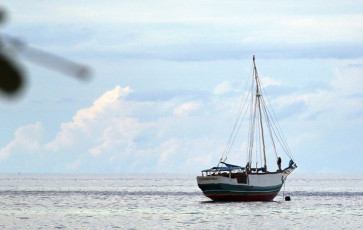Popular Reads
Top Results
Can't find what you're looking for?
View all search resultsPopular Reads
Top Results
Can't find what you're looking for?
View all search resultsMore research needed on piracy in Asia
It may require intellectual and professional effort to constantly shift focus from the field to the academic fora, but this “methodological harmony” or melting pot, especially between international relations and anthropology or geography, promisingly echoes the Indonesian (and European) motto: “(intellectual) unity in (methodological) diversity”!
Change text size
Gift Premium Articles
to Anyone
I
nvesting in field research — which requires academically collecting human intelligence — is becoming tricky for researchers. This is due to the rising demand for expertise on TV and in newspapers as well as to the increasing pressure caused by constraints on funding and rankings to produce and publish research within institutes and think tanks.
Note the patience that Claude Levi-Strauss had to accord in his fieldwork on indigenous tribes in Brazil in the 1930s, and TE Lawrence’s sacrifices to be accepted by the Arabic tribes during World War I.
Today, it is much more tempting to rely on secondary sources knowing that social networks and the inflation of Track 2 meetings can facilitate access to reports and comments. Of course, tweets and posts are a fantastic opportunity to get brilliant insights and relevant comments from highly esteemed scholars. However, this methodology can lead to Pierre Bourdieu’s “circular circulation of information”, when members of a community repeat the thoughts or analysis of each other.
It can also result in an overreliance on organizations, which publish papers according to their own — even if legitimate and well-intentioned — agenda. This trend seems to be particularly true in the field of maritime security.
Thankfully, new actors such as NGOs are beginning to emerge from Africa. Since the success of the Asia model in securing sea lanes like the Straits of Malacca and Singapore, since the first Information Fusion Center in Singapore in 2009, other such centers in Madagascar and India have followed suit.
This is accompanied by the rise of NGOs such as the self-funded One Earth Future Foundation, which is now working in Asia on a Bay of Bengal maritime security report and a “Maritime Security Index” by expanding its focus beyond Africa. These initiatives follow the release of an in-depth report on the Sulu-Sulawesi Seas and a maritime policy workshop earlier this year.
Some other NGOs working on illegal fishing and diplomatic mediation are also invited to academic meetings where they bring feedback from the field.
Your Opinion Matters
Share your experiences, suggestions, and any issues you've encountered on The Jakarta Post. We're here to listen.
Thank you
Thank you for sharing your thoughts. We appreciate your feedback.


















